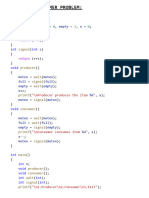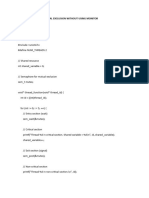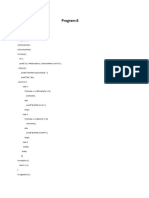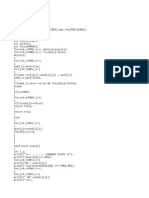0% found this document useful (0 votes)
5 views3 pagesAll OS Lab Programs
The document contains C programs for various CPU scheduling algorithms including FCFS, SJF, and Round Robin, as well as the Banker's Algorithm for deadlock avoidance. Each section provides code to input process details, calculate waiting time (WT), turnaround time (TAT), and display the results. The programs are designed to help understand and implement these fundamental operating system concepts.
Uploaded by
mp1121451Copyright
© © All Rights Reserved
We take content rights seriously. If you suspect this is your content, claim it here.
Available Formats
Download as PDF, TXT or read online on Scribd
0% found this document useful (0 votes)
5 views3 pagesAll OS Lab Programs
The document contains C programs for various CPU scheduling algorithms including FCFS, SJF, and Round Robin, as well as the Banker's Algorithm for deadlock avoidance. Each section provides code to input process details, calculate waiting time (WT), turnaround time (TAT), and display the results. The programs are designed to help understand and implement these fundamental operating system concepts.
Uploaded by
mp1121451Copyright
© © All Rights Reserved
We take content rights seriously. If you suspect this is your content, claim it here.
Available Formats
Download as PDF, TXT or read online on Scribd
/ 3
























































































